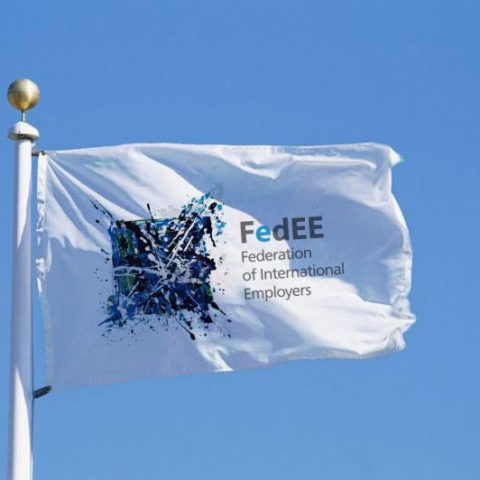Sense out of uncertainty, HR without borders
FedEE: The World’s leading organisation for multinational employers.
Successful employers belong to FedEE because we provide the kind of fast, high quality service that gives HR professionals in multinational organisations the special edge they require to stay ahead of events. An illustration of this is the fact that we have predicted not only 9/11, the 2007/8 meltdown, the Brexit result, but also the pandemic – six months before it happened. Furthermore, our Members jointly command assets that are larger than China’s annual GDP and three times the worth of the US Federal government. One FedEE Member put the way we make a difference this way:
“I do not have the time to brief outsiders and start worrying about professional fees before I can get a job done. I just need someone I can trust who will give me an honest second opinion and help me sort things out so that I can move onto other things. My company cannot carry all the expertise about international HR laws and practices it needs in-house – so the next best thing is FedEE. You have no equal and those who do not know about you do not know what they are missing!”
Above all, we are politically neutral and independently funded by our Members – with no financial support from governments, political parties or pressure groups. We also receive no revenue from advertisers or sponsors and take your corporate privacy very seriously.
❖ Join our top multinationals: We are Chaired by the Ford Motor Company, whilst Houlihan Lokey – a leading US investment bank – is on our Board. In fact, 40% of all the top global companies are FedEE Corporate Members.
❖Monitoring global developments: We track new and revised laws, legal cases, HR practices and wider socio-political developments that affect company payrolls – all in a timely and practical way.
❖FedEE actively lobbies governments around the World and the EU. We act as a ‘think tank’, developing common policies and advising on practical ways to deregulate.
❖ Do you need to secure expertise to undertake international legal research, or do you dream of having faster, more competent and practical external legal advisers? Then join FedEE and utilize our customised employment law services. Many of the largest organisations in the World use ‘FedEE Law’ on a regular basis.
❖ Do not be deceived by manipulated official statistics. We indicate the data you can trust and provide the true picture that governments often wish to obscure from view. We also warn member companies about the previously unrealised implications of planned changes in the employment field.

International HR Answers in Seconds
FedEE was developed to provide an essential professional support service to those in multinational HR departments.
We focus on key developments so you can get on with your core day-to-day activities. You do not need a legal database containing 1000s of new laws and court cases to read every day, nor do you have the time to wait for a call-back from a law firm – but you do need to know if your company faces a new employer obligation in a particular country, if a key deadline is coming up on the radar, or how to resolve a difficult employee problem in real-time.
FedEE also produces news reports you would never receive from any other source. This is partly because we monitor changes in over 30 languages. We also have a tiered support system so that if you need to know more, you may go to our online knowledgebase, or simply call our multinational helpline. 87% of helpline enquiries are resolved within two hours, after just one direct call to an Advisor. Our service is also multi-user – so several colleagues may access it in their own right. Few lawyers have hands on HR experience and so their guidance is often rigid, obscure and off the mark. We go beyond the law and aim at finding practical, management solutions that stick and make good economic sense.
What you will also discover as a member of FedEE is our far-sighted view of the future. Here, for instance, is the introductory paragraph to an article in ‘Industrial Management and Data Systems” written by our Secretary-General, Robin Chater, which was published back on 1st March 1989 – entitled “Industrial depopulation: the politics of automation”.
“As computerised manufacture merges into computer integrated manufacture, with expert computer systems controlling other expert systems, where do human beings come in? Are they gaining or losing? Are they drifting into a catch‐22 situation? Maybe the time will come when they are merely spectators. The mushrooming progress of technology is reflected on, who is gaining and who is losing are questioned and a suggested plan of action is provided to keep progress – at least technological progress – on the rails”.
You could probably secure a near alternative to FedEE by hiring a team of talented HR professionals, lawyers and economists with years of working in many jurisdictions and industry sectors, then by arming them with numerous costly database subscriptions – or you could simply sign up to FedEE at fraction of the cost. That is perhaps why many HR departments around the World have relied on FedEE for well over three decades.
Examples of issues we have reviewed:
❖ The facility now available, thanks to the Federal Labour Court in Germany, to charge departing employees for the cost of investigating their malpractices.
❖ Why the expenses reimbursed to employees for using their own cars for business purposes in Poland counts as taxable income.
❖ Why Trump’s treatment of Ukraine is going to create a huge jobs stimulus across the EU economy.
❖ How ‘Resignation Agents’ operate in Japan and how their legality is likely to be severely limited.
❖ Why employers in Lithuania may now ask an employee, or prospective employee, for criminal record certification without having any stated need to do so.
❖ The fact that overtime work in Mexico beyond legal limits is now treated as a form of labour exploitation punishable by up to 12 years imprisonment.
❖ The increasing difficulty in the European Union for an employer to sidestep liability for errors leading to a GDPR breach by their employees.
❖ Progress being made in the UAE over Emiratisation targets
❖ Why vacation days in the EU may not be forfeited at year end unless employers take specific actions.
The FedEE Story
FedEE was supported initially by the European Commission.
What We Do
FedEE offers a range of “must have” services to multinational employers.
FedEE Achievements
Some achievements since foundation in 1988.
EU Overtime Rules
An overview of the current structure of law governing the working of extra hours.

Career Path to Becoming an HR Director (HRD)
A lot is written about how to reach the top of the HR career ladder, but there is little of substance ever revealed about it. Most guidance focuses on obtaining the right qualifications and fails to distinguish the kind of jobs that lie at the top of the ladder. In truth, the pathway to the top is generally very tough and the best HRD jobs are the most demanding because they are those in multinational corporations. Here the job title too can vary from Director to VP or Chief People Officer. It may be a Group role or heading up either a country or regional operation.
It certainly takes a high level of competence, an effective personality, determination and a large measure of luck to advance so far. But the hard facts are also key to understanding what it takes.
FedEE has recently sought to untangle this mystery by asking several fundamental questions. Based on analysis of current CVs for a cross section of those in HRD jobs within multinational enterprises across Europe and North America we have found that 60% of HRDs are female and 10% of HRDs do not even have a degree. The average time in their current HRD post is 4.6 years and that it takes, on average, eight career moves (many of them sideways) to get to the top. Few actually make it to the top in the same organization, and the time in post immediately before the big job averages 3.8 years. Two thirds of those who are successful do so without ever working outside the HR function and, contrary to expectation, female HRDs do not need to climb their way through more jobs on the way to the top job than their male counterparts.

Labour Market Trends (LMT)
The latest issue of LMT provides a detailed analysis of the EU Directive on Corporate Sustainability Due Diligence and outlines how a multinational company should prepare for handling the tasks it lays down for them from 2028. Our particular focus is on the role of the HR function.
The next three issues of our regular quarterly publication shall be looking at other important contemporary HR issues. The forthcoming issue in July 2025 shall focus on Employee Engagement and how to improve involvement and commitment, reduce the turnover of key personnel and encourage ‘corporate brand’ loyalty.
In the Autumn of 2025 we shall be demonstrating how large employers can develop their own higher educational capabilities through Alternative Corporate Qualifications (ACQs) to attract and retain the best potential talent at an early age, save young gifted individuals from having to clock up debts to secure conventional University qualifications, use the latent academic skills of in-house professionals and tailor courses to the exact needs of the organization.
Finally, at the end of 2025 we shall be examining statutory requirements and company practices in respect to individual and collective Employee Retrenchment and Severance Practices around the World.

FedEE Study: Having What it Takes to Get on
Why do some people end up in dead-end jobs and others flourish – achieving well paid and satisfying jobs by their mid 30s? Is it all a matter of upbringing, education and choosing the right occupational field – or is it to do with a far more complex set of factors?
“Explaining Success” is the latest study from the Federation of International Employers (FedEE) in its quarterly ‘Labour Market Trends’ series. It examines a wide range of factors from the first year of schooling to gender, hair colour and University status in a statistical quest to discover which factors most determine career paths, earnings and lifetime earnings. On the way, it reveals some unexpected factors – such as those with the top 1% of IQs do not succeed as well as the less gifted climber on the career ladder and that going to a top University is probably not the ideal launching point for becoming the CEO of a major multinational.
As the study clearly illustrates, one important role for the HR professional is not just to secure, retain and motivate top talent, but to step in and rescue those whose careers come to an effective standstill along the ladder to the top. Few can reach the very top of the ladder, but all organisations rely upon retaining positive attitudes and a feeling of relative success amongst those ending up in mid-level positions and sub ‘C-Suite” roles of senior management.
Labour Market Trend Reports are available free to all users in FedEE Member companies. Press copies are also available on request.

FedEE Contact and Findings
Anti-Trust Actions
The increasing risks of HR practitioners being penalised for market collusion.
Leave Carryover
The law across Europe concerning the right to carryover untaken annual leave from year to year
Past Newswires
Examples of our fortnightly newswires sent to all FedEE Member organizations.

Join FedEE Today
Many of the world’s largest multinational companies already belong to The Federation of International Employers (FedEE®). We have a Worldwide Membership – with particular concentrations in North America, Western Europe, India and Japan. We were founded in 1988 and are regularly voted by our Members as an organisation they would recommend to other multinationals.
If your company has over 150 employees in two or more countries, has its own in-house HR department, and has been operating for two or more years then you really cannot afford to operate without being part of the Federation. The approval process takes less than a day and for immediate access to our services we have an online credit card payment facility. Membership costs as little as €998.00 a year. Please check here to view the table of our membership services. Sign up now.
What Next?
Once a completed application has been received it will be quickly reviewed by our Membership Review Group and, if approved, we shall send an email to the applicant confirming acceptance – normally within 24 hours. The Secretary-General also usually calls to welcome all new members.
Our letter of confirmation will have an attached invoice containing our bank details to allow payment. The membership fee may be settled by bank transfer within 35 days or, on request, via a credit card payment link. As soon as the fee has been settled we shall send out passwords to all nominated users and place them on our Newswire list. At the end of each subscription year we shall write inviting the Corporate Member to renew. 94% of Members renew at this time.
Membership renewal is not automatic, but we shall retain membership for a certain period to allow for continuity. Helpline bundles may be purchased at any time and unused enquiries in the bundles do not expire whilst membership is retained.
Contact Us
Address, email, telephone numbers and on line payments so you can get in touch from anywhere around the world.
Senior Management Team
Introducing our key staff and Board Members.
FedEE Customised HR services
The FedEE Legal Counsel team is constantly called upon for tailored research and advice.
Clear Thinking
Most people are not taught to think and few realize that clear thinking originates in perceptions and personal identity.











